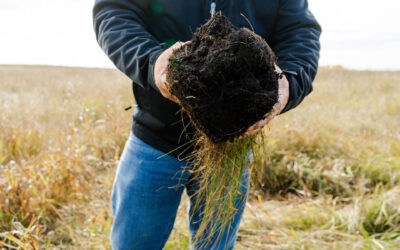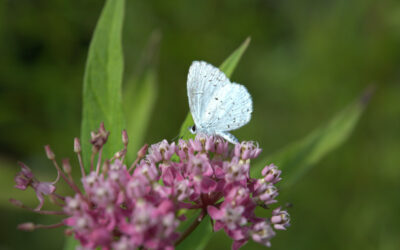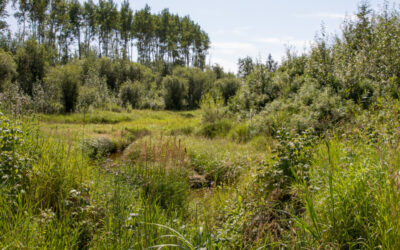ALUS LSR participants Gord and Marg Hammell partnered with both ALUS and the Manitoba Habitat Heritage Corporation to enhance nature on their farmland.

“Working with ALUS gives me the flexibility to adjust my approach to control invasive weeds on my land,” says ALUS LSR participant and PAC member Gord Hammell. Photo: Cindy Murray
Located on the rolling prairie landscape near Erikson, Manitoba, just south of the Riding Mountain National Park, is a farm that hums with life.
Gord and Marg Hammell’s land is home to pollinators such as bees and butterflies, and birds such as waterfowl and bluebirds—encouraged by the many bluebird boxes they have installed.
Hammells bought this land in the 1970s and started a small dairy operation from the roots up. After farming for 35 years, they retired and now rent out their pastureland to a neighbour for grazing.
Gord signed up as a PAC member with the ALUS LSR program (a partnership between ALUS Canada and the Little Saskatchewan River Conservation District) in 2016, and the Hammells enrolled as participants in 2017.
Today, they have five ALUS projects, totaling a little more than eight acres, all with a wetland and riparian focus.

In an interesting twist, the Hammells opted to partner with both ALUS LSR and the Manitoba Habitat Heritage Corporation (MHHC) to restore wetlands and enhance riparian habitat on their land.
The Hammells like the long-term easement offered by MHHC, which helped to restore the water body itself, but wanted to couple that with support offered by ALUS, which was well suited to their management strategy.
As active stewards of the land, Gord and Marg have experienced the all-too-familiar struggle of trying to control invasive weeds, such as burdock, plaguing this region of the Prairies. ALUS helps them to enhance, manage and maintain the riparian zone around this water body, and to control the spread of the invasive plants.
“Working with ALUS gives me the flexibility to adjust my approach to control invasive weeds on my land,” says Gord, “while the MHHC provides permanent protection for the wetlands.”

Gord and Marg Hammell’s land is home to pollinators such as bees and butterflies, and birds such as waterfowl and bluebirds—encouraged by the many bluebird boxes they have installed.
And now, even in dry conditions, the Hammells’ pastures remain lush, green and productive.
This is partly due to careful rotational grazing, through which the Hammells and their farm tenants have improved soil health and drought resistance on their land.
It is also thanks to the effect of their ALUS wetland and riparian projects, which help to improve soil health, improve water infiltration into the soil and hold water on the landscape.
“As a partnership with both ALUS LSR and MHHC, the Hammell project is a great representation of the integrated approach that is one of the principles of the ALUS program,” says Paige Englot, ALUS Canada’s Prairie Hub Manager.
To learn more about the ALUS LSR program, visit their webpage.

Despite the area’s dry conditions, Hammell’s pastures remain lush, green and productive, thanks partly to the effect of his ALUS wetland and riparian projects, which help to improve soil health, improve water infiltration into the soil and hold water on the landscape.



